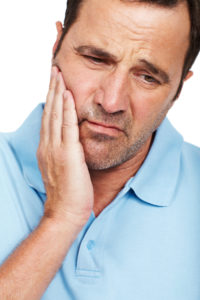
While not always easy to diagnose, these symptoms and others are signs of temporomandibular joint disorder (TMJ or TMD). These are a group of conditions caused by the compromised function of the jaw joint and the muscles that are responsible for jaw movement.
We diagnose and treat TMJ at Gentle Dental.
What causes TMJ?
There isn’t usually an exact cause/effect relationship with TMJ. It’s believed that most problems arise from the muscles that move the joint and from problems with the parts of the joint. It’s thought that possible causes are excessive teeth grinding and clenching of the teeth (usually from stress), dislocation of the disc and soft cushion between the ball and socket of the joint, and osteoarthritis in the joint.
What are the symptoms of TMJ?
These are common symptoms associated with TMJ:
- Pain in your face, jaw joint area, neck, shoulders, or around your ears when you use your jaw
- Problems when you open your mouth wide
- Clicking or popping sounds when you open or close your mouth or chew
- Jaws that lock or get stuck when open or closed
- Trouble chewing or an uncomfortable bite, with the feeling that your jaws are not aligned
- Swelling on the side of the face
- A tired feeling on your face
Other symptoms are headaches, toothaches, dizziness, earaches, hearing problems, ringing in your ears, and upper shoulder pain.
Treating TMJ
TMJ disorders are commonly misdiagnosed. Symptoms such as earaches the or ringing in the ears can lead a person to consult an Ear, Nose, and Throat specialist. Dentists, when they don’t find any signs of decay or gum disease, can also be at a loss to understand that the problems arise with the temporomandibular joint.
At Gentle Dental, we have extensive experience diagnosing and treating TMJ. Here are some of the treatments we use:
- Bite splint— We create a custom bite splint, a plastic mouth guard that is placed over your upper or lower teeth to make them slide smoothly against each other, rather than clenching.
- Physical therapy— Stretching exercises and biofeedback can overcome muscle clenching.
- Ultrasound energy— Deep heat from ultrasound waves can be applied to the joint.
- Radiofrequency energy— RF waves can be used to stimulate the joint.
- Laser therapy— Laser energy can lower pain and corresponding inflammation, increasing a range of motion.
- Medications— Anti-inflammatory medications reduce the pain and the inflammation in the muscles that are restricting jaw movement. Anti-anxiety drugs and muscle relaxers may also be used.
- Botox— This famed wrinkle eraser on the upper third of the face temporarily stops muscles from contracting. This can be effective for overly active jaw muscles.
If you have any of the above symptoms of TMJ, there’s no reason to suffer through them. Call the team at Gentle Dental, (732) 549-5660, and let us help solve your TMJ problem.



